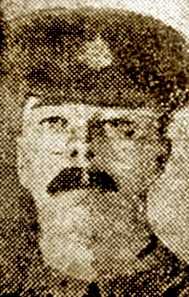Among the unpleasant duties which fell to the lot of Pte Horace William Kilby, 21468, 9th Battalion East Surrey Regiment, of 11 Salisbury Road, Luton, during the time of his captivity as a prisoner of war in Germany was the burying of the dead bodies of those of his comrades who had succumbed to illness etc. He tells us that on his last birthday on June 4, he interred no fewer than 48. This was in the course of a seven months' stay at a hospital, suffering from dysentery, the disease from which so many of his comrades died.
 When he was captured on March 24, 1918, the party of which he was a member had a five-day walk, and during the whole of that time all he got was a slice of bread and one cup of a 'coffee' substitute.
When he was captured on March 24, 1918, the party of which he was a member had a five-day walk, and during the whole of that time all he got was a slice of bread and one cup of a 'coffee' substitute.
He spent a time at Marloie, Belgium, where the British were sent out on working parties for 12 hours a day. The food was very bad, but after he got into hospital he fared better in that respect.
At the end of August he came out of hospital and was attached to another working party. Five weeks were spent in carrying ammunition to the lines, and then he was shifted to another command depot, and from then visited several other places in Belgium and Northern France on railway work etc.
When the news of the signing of the armistice was received the prisoners 'downed tools' and on November 27 they arrived at Calais. England was reached on December 1, and Pte Kilby got home three days later.
On the whole, he said, his treatment was no so bad as that of many. Some were handled cruelly and many died on the road home. The working party never had any shoes on their feet, the clogs served out being unwearable – in fact Pte Kilby was still suffering from the effects of insufficient protection whilst working for the Germans.
[Born in Luton on June 12, 1880, Pte Kilby married Mary Elizabeth Philpot in Luton on November 18, 1901. Son Archibald William was born in 1903. He had been wounded in the side by shrapnel while on duty as a stretcher-bearer in August 1917. After hospital treatment in England. He returned to France on New Year's Day 1918. He attended a dinner in Luton for returned POWs in March 1919.]
[Beds & Herts Saturday Telegraph: January 4, 1919]

